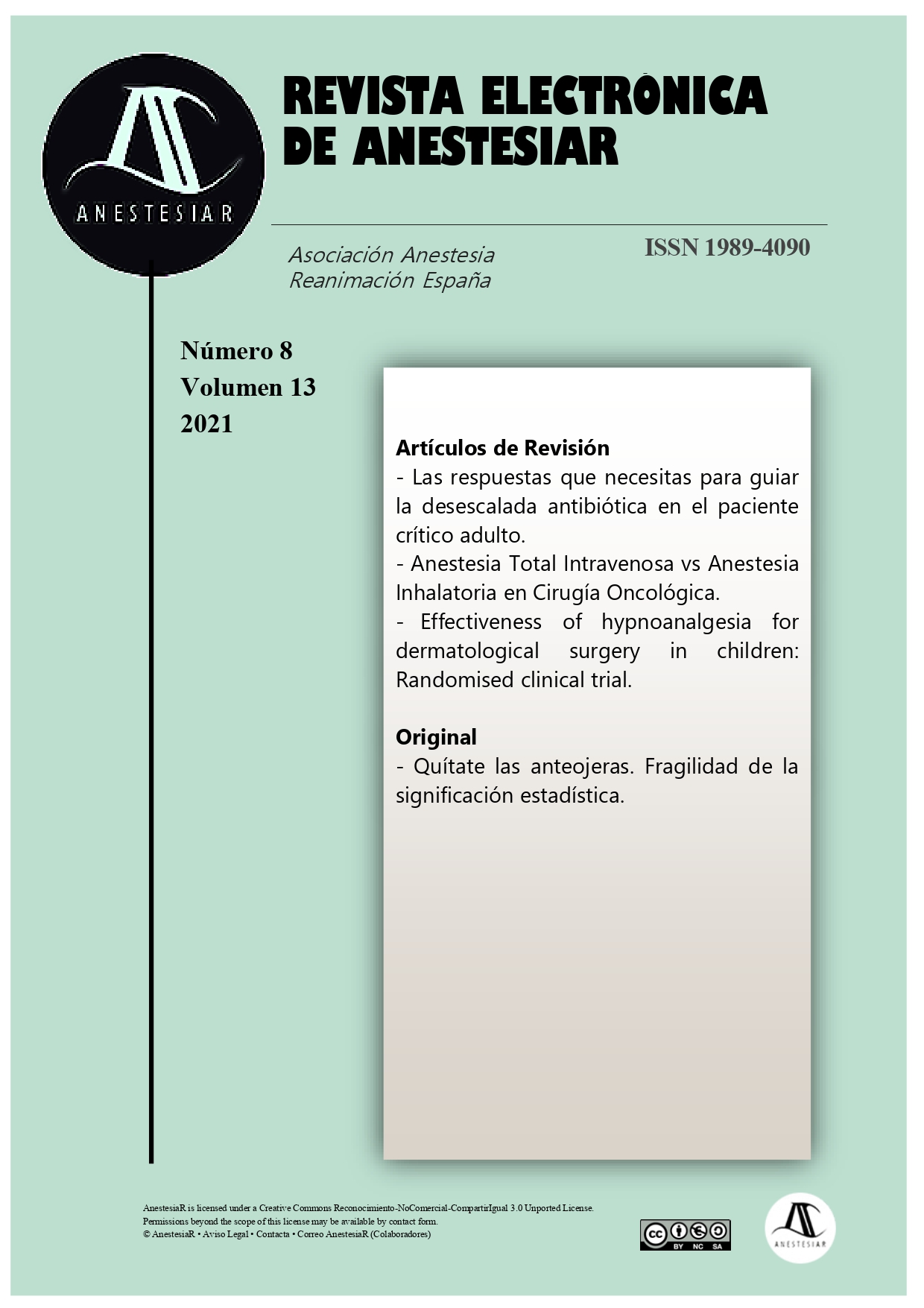Total Intravenous Anesthesia vs Inhalatory Anesthesia in oncological surgery.
DOI:
https://doi.org/10.30445/rear.v13i8.967Keywords:
Propofol TIVA-TCI, TCISurvival, Oncologic surgery, Inhalation anaesthesiaAbstract
Never before has cancer been insidious and prevalent as currently. Anaesthetic agents have shown different effects on cancer cell growth and metastasis, a fact that may have an impact in terms of survival.
In the last years, different studies have been done to find the optimal combination of anaesthetic agent and technique.
Data regarding propofol TIVA-TCI vs inhalational agents on cancer is enormous. Propofol has shown significant benefits: antitumor and anti-inflammatory properties, less nausea and vomiting, faster post-surgical recovery and less environmental pollution. However, effects on long term outcomes in comparison with halogenated agents are not apparent. Most of the articles performed in humans are retrospective, and there’s a lack of standardization in most of them. More studies are needed to obtain reliable data that could tip the scales towards one type or another of anaesthesia during cancer surgery.
To conclude, we need to find the most beneficial technique for each type of cancer surgery. Hence we should continue investigating because the whole population would benefit significantly.
References
Irwin MG, Chung CKE, Ip KY WM. Influence of propofol-based total intravenous anaesthesia on peri-operative outcome measures: a narrative review. Anaesthesia. 2020;75(suppl. 1):e90– 100.
Buckley A, McQuaid S, Johnson P BD. Effect of anaesthesic technique on the natural killer cell anti-tumour activity of serum from women undergoing breast cancer surgery: a pilot study. Br J Anaesth. 2014;113:1:56.
Lee JH, Kang SH, Kim Y, Kim HA, Kim BS. Effects of propofol-based total intravenous anesthesia on recurrence and overall survival in patients after modified radical mastectomy: A retrospective study. Korean J Anesthesiol. 2016;69(2):126–32.
Miller D, Lewis SR, Pritchard MW, Schofield-Robinson OJ, Shelton CL, Alderson P et al. Intravenous versus inhalational maintenance of anaesthesia for postoperative cognitive outcomes in elderly people undergoing non-cardiac surgery (Review). Cochrane Database Syst Rev. 2018; Art. No.(8).
Jaura AI, Flood G, Gallagher HC BD. Differential effects of serum from patients administered distinct anaesthetic techniques on apoptosis in breast cancer cells in vitro: a pilot study. Br J Anaesth. 2014;113 Suppl:1-63.
Soltanizadeh S, Degett TH, Gögenur I. Outcomes of cancer surgery after inhalational and intravenous anesthesia: A systematic review. J Clin Anesth. 2017;42:19-25.
Sessler DI, Pei L, Huang Y, Fleischmann E, Marhofer P, Kurz A, et al. Recurrence of breast cancer after regional or general anaesthesia: a randomised controlled trial. Lancet. 2019;394(10211):1807–15.
Kanako Makito, Hiroki Matsui, Kiyohide Fushimi, Hideo Yasunaga; Volatileversus Total Intravenous Anesthesia for Cancer Prognosis in Patients Having Digestive Cancer Surgery: A Nationwide Retrospective Cohort Study. Anesthesiology 2020; 133:764–773.
Forget P, Collet V, Lavand’homme P, De Kock M. Does analgesia and condition influence immunity after surgery? Effects of fentanyl, ketamine and clonidine on natural killer activity at different ages. Eur J Anaesthesiol. 2010;27:233.
Chamaraux-Tran TN, Mathelin C, Aprahamian M et al. Antitumor Effects of Lidocaine on Human Breast Cancer Cells: An In Vitro and In Vivo Experimental Trial. Anticancer Res. 2018;38–95.
Downloads
Published
How to Cite
Issue
Section
License
Copyright (c) 2021 Revista Electrónica AnestesiaR

This work is licensed under a Creative Commons Attribution-ShareAlike 4.0 International License.
 Envío y derechos de autor
Envío y derechos de autor


 Revista Electrónica AnestesiaR by
Revista Electrónica AnestesiaR by 